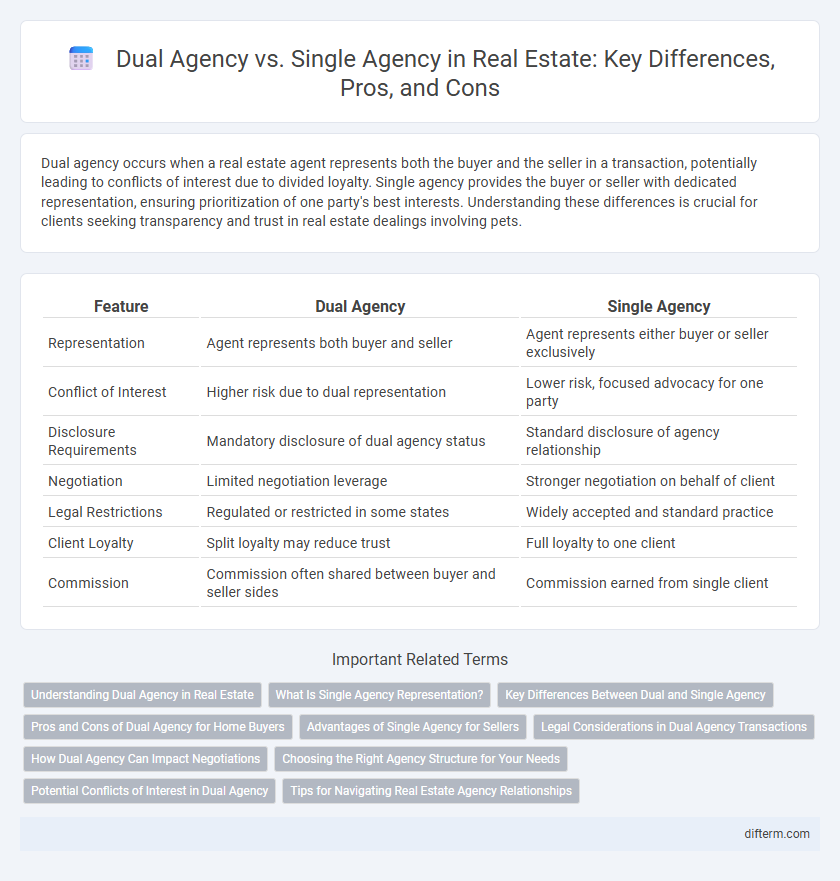Dual agency occurs when a real estate agent represents both the buyer and the seller in a transaction, potentially leading to conflicts of interest due to divided loyalty. Single agency provides the buyer or seller with dedicated representation, ensuring prioritization of one party's best interests. Understanding these differences is crucial for clients seeking transparency and trust in real estate dealings involving pets.
Table of Comparison
| Feature | Dual Agency | Single Agency |
|---|---|---|
| Representation | Agent represents both buyer and seller | Agent represents either buyer or seller exclusively |
| Conflict of Interest | Higher risk due to dual representation | Lower risk, focused advocacy for one party |
| Disclosure Requirements | Mandatory disclosure of dual agency status | Standard disclosure of agency relationship |
| Negotiation | Limited negotiation leverage | Stronger negotiation on behalf of client |
| Legal Restrictions | Regulated or restricted in some states | Widely accepted and standard practice |
| Client Loyalty | Split loyalty may reduce trust | Full loyalty to one client |
| Commission | Commission often shared between buyer and seller sides | Commission earned from single client |
Understanding Dual Agency in Real Estate
Dual agency in real estate occurs when a single agent or brokerage represents both the buyer and the seller in the same transaction, which can create potential conflicts of interest. This arrangement requires full disclosure and informed consent from both parties to comply with legal and ethical standards. Understanding the implications of dual agency helps buyers and sellers make informed decisions about representation and ensures transparency throughout the transaction.
What Is Single Agency Representation?
Single agency representation occurs when a real estate agent exclusively represents either the buyer or the seller in a transaction, ensuring undivided loyalty and full fiduciary duties to their client. This arrangement provides clear advocacy, confidentiality, and a focused negotiation strategy tailored to the client's best interests. Single agency helps prevent conflicts of interest, enhancing trust and transparency throughout the home buying or selling process.
Key Differences Between Dual and Single Agency
Dual agency occurs when a real estate agent represents both the buyer and the seller in the same transaction, potentially leading to conflicts of interest due to divided loyalty. Single agency involves the agent representing only one party, either the buyer or the seller, ensuring dedicated advocacy and confidentiality. The key difference lies in fiduciary duties: single agents owe undivided loyalty and full disclosure to their client, while dual agents must balance duties impartially, often limiting the level of advice and negotiation they can provide.
Pros and Cons of Dual Agency for Home Buyers
Dual agency allows buyers to work with one agent representing both parties, streamlining communication and potentially speeding up the transaction process. However, the main drawback is the inherent conflict of interest, as the agent may struggle to advocate fully for the buyer while also serving the seller. Homebuyers should carefully weigh the risk of compromised negotiation power against the convenience offered by dual agency.
Advantages of Single Agency for Sellers
Single agency offers sellers dedicated representation, ensuring their interests and confidentiality are prioritized throughout the transaction. With a single agent exclusively advocating for the seller, there is clearer communication and tailored negotiation strategies aimed at maximizing sale price. This focused commitment reduces conflicts of interest and fosters trust, enhancing the overall selling experience.
Legal Considerations in Dual Agency Transactions
Dual agency in real estate involves one agent representing both buyer and seller, raising complex legal considerations regarding fiduciary duties and conflict of interest. Agents must provide full disclosure, obtain informed consent from both parties, and maintain impartiality to comply with state laws and ethical standards. Failure to adhere to these legal requirements can result in liability, including potential claims of breach of duty or professional negligence.
How Dual Agency Can Impact Negotiations
Dual agency can significantly impact negotiations by creating potential conflicts of interest, as the agent represents both the buyer and the seller, limiting their ability to advocate fully for either party. Without clear boundaries, dual agents may struggle to provide unbiased advice or negotiate the best terms, risking diminished trust and satisfaction. Single agency, by contrast, allows agents to focus exclusively on one client's goals, often leading to more effective and tailored negotiation strategies.
Choosing the Right Agency Structure for Your Needs
Choosing the right agency structure depends on your priorities for representation and transparency in real estate transactions. Dual agency involves one agent representing both buyer and seller, which may save time but can limit advocacy due to potential conflicts of interest. Single agency provides dedicated representation for either party, ensuring focused negotiation and personalized support tailored to your specific needs.
Potential Conflicts of Interest in Dual Agency
Dual agency in real estate poses potential conflicts of interest as the agent represents both the buyer and seller in the same transaction, making it challenging to advocate fully for either party's best interests. Single agency, by contrast, ensures dedicated representation, providing clearer loyalty and confidentiality to one client, which reduces the risk of divided duties. Regulatory frameworks in many states impose strict disclosure requirements for dual agency to mitigate these inherent conflicts.
Tips for Navigating Real Estate Agency Relationships
Understanding the distinctions between dual agency and single agency is crucial for safeguarding your interests in real estate transactions. In single agency, the agent represents either the buyer or the seller exclusively, ensuring undivided loyalty and confidential advice. When considering dual agency, where one agent represents both parties, insist on full transparency, clear communication, and written consent to avoid conflicts of interest and ensure fair negotiation.
Dual Agency vs Single Agency Infographic

 difterm.com
difterm.com